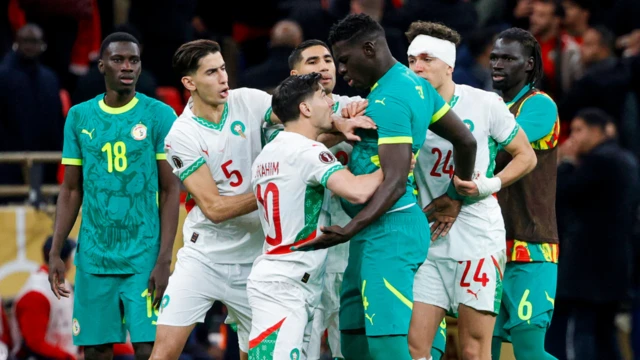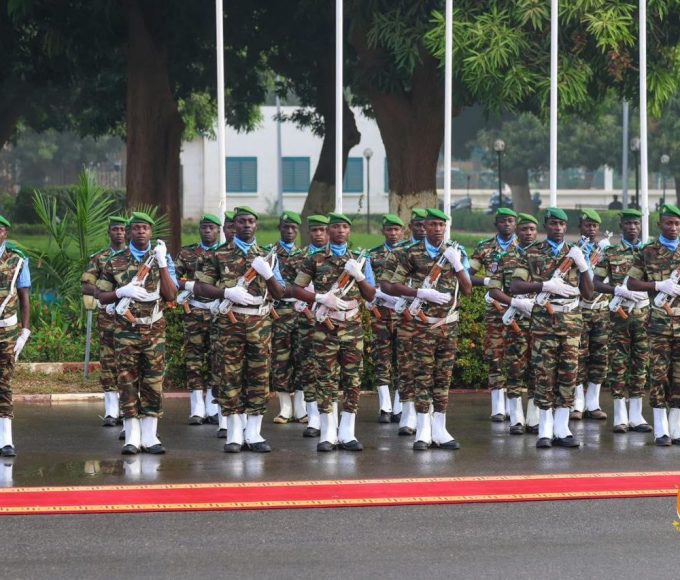
Betrayed at the Starting Line: Why Nigerian Athletes Are Switching Flags

On the surface, Favour Ofili’s sprint from Nigeria to Turkey may look like just another case of athlete migration. But for those who have followed Nigerian athletics for decades, it is a damning indictment of a broken system, one that has repeatedly driven away its talent through neglect, incompetence, and a glaring lack of accountability.
Ofili, one of Nigeria’s most promising sprinters and a rising global star, met the 100m qualifying standard for the Paris 2024 Olympics. But that victory was short-lived. Despite her achievement, the Athletics Federation of Nigeria (AFN) and the Nigerian Olympic Committee (NOC) failed to submit her name for the Games. This procedural error prevented her from securing a second Olympic appearance. The first came in 2021, when she and 13 other Nigerian athletes were barred from competing at the Tokyo Olympics due to the AFN and the National Anti-Doping Committee (NADC) failing to meet basic drug testing requirements.
Disillusioned, humiliated, and tired of waiting for reform, Ofili initiated a formal complaint with the Athletics Integrity Unit (AIU) and began her process of transferring national allegiance to Turkey on May 31, 2025. Days later, the same AFN leadership, under which this pattern of administrative failure occurred, was re-elected.
This wasn’t an isolated incident. It is part of a long, painful legacy.
Gloria Alozie: A Silver Medal in Tears
Growing up in Abia State, Gloria Alozie was a prodigious talent. Her family, friends, and community all saw it. She sprinted with blazing speed through school competitions, and by 1995, she was wearing Nigeria’s colours at the African Junior Championships in Côte d’Ivoire. “It looked like a dream,” she told TRT World.
Her rise in the 100m hurdles was meteoric. But on the eve of the Sydney 2000 Olympics, tragedy struck her fiancé, a fellow Nigerian athlete and reserve in the 4x400m team, who died in a road accident in the Olympic village. She ran anyway, grieving, and won silver in the 100m hurdles, becoming Nigeria’s only athletics medalist at those Games.
Then came the insult. According to reports at the time, the Nigerian Olympic Committee refused to pay for her fiancé’s body to be flown back home because he was “not an official member of the team.” Alozie’s agent later denied the claim, but the damage had been done.
“What happened in Sydney 2000 for me is a forbidden story,” Alozie said. Not long after, she switched allegiance to Spain, where she won gold at the European Championships and rebuilt her career.
“I had to obtain Spanish nationality for my career to flow well,” she said. Nigeria had once again lost a star.
Paris 2024: Three Medals, Zero for Nigeria
At the 2024 Olympics in Paris, the pattern repeated itself with painful clarity.
With a Nigerian father from Ekiti and a German mother, Yemisi Ogunleye clinched gold in the women’s shot put for Germany with a powerful throw of 20.00m, Germany’s first gold in that event since 1996. Ogunleye became the third Nigerian-heritage athlete to medal in Paris, while Nigeria still searched for its first gold medal.
Born Ebelechukwu Agbapuonwu in Onitsha, Naser started her career in Nigeria before moving to Bahrain at 15. There, she converted to Islam, changed her name, and began competing internationally. In Paris, she secured silver in the women’s 400m, finishing just behind Dominican Republic’s Marileidy Paulino.
Born and raised in the U.S. to Nigerian parents, Echikunwoke once declared for Nigeria and was set to compete at the Tokyo 2020 Olympics, but the AFN failed in doping compliance, leading to her disqualification. She switched allegiance to the U.S. and won silver in the hammer throw at the Paris 2024.
Neglect, Injustice, Incompetence
Bad governance isn’t limited to selection issues. Chioma Ajunwa, Nigeria’s first Olympic gold medalist (Atlanta 1996), was denied a promised house by the Lagos State Government for 25 years, until public outrage led to its fulfilment.
Even today, Nigeria’s male basketball team (D’Tigers) turned to GoFundMe to raise money for training and logistics at the Olympics. Nigeria’s 4x400m women’s relay team was disqualified due to technical errors blamed on officials. The failures are institutional.
From Green to Gone
Francis Obikwelu is a name etched in Olympic history, not just for his speed, but for the symbol he became. Once the pride of Nigerian athletics, Obikwelu left the country in frustration after years of poor treatment by Nigerian officials. After sustaining a knee injury in Sydney 2000, the AFN accused him of faking it.
“They told me they didn’t need me, that they could produce another Obikwelu,” he said in an interview. He paid for his surgery in Canada himself. Not a single call came from the federation.
In 2004, he stormed the Olympic 100m final wearing Portugal’s colours and returned home with a silver medal, a feat no Nigerian has achieved in that event. However, in a moment that now reads like tragic comedy, some Team Nigeria officials reportedly celebrated his victory as if he still ran under their flag.
Oluwakemi Adekoya, born in Lagos, now runs for Bahrain. Femi Ogunode, once a student athlete at the University of Ibadan, now competes for Qatar. A single email from Qatar changed his life. Nigeria had shut the door.
Decades later, Nigeria’s story remains tragically unchanged. Only the names have shifted: Favour Ofili. Tobi Amusan, who despite becoming the first Nigerian to win a world championship gold medal in athletics, has faced bouts of institutional pushback. Divine Oduduru, Chidi Okezie. All have struggled through systems riddled with neglect, politicisation, and inadequate support.
More recently, international championships have begun to look like a showcase of what Nigeria could have been. Foreign checks or flashy endorsements did not lure these athletes away. In most cases, they sought structure, professionalism, and dignity, things they could not find at home.
Athletics in Crisis: Not a New Story
The cracks in Nigeria’s sporting institutions didn’t start yesterday. They’re the result of decades of decay, a toxic mix of corruption, indifference, and institutional disrepair.
Since the mid-1990s, Nigerian athletics has experienced a gradual decline. Once a regular feature in global track and field finals, Nigeria now struggles to qualify athletes for major events, let alone reach the podium. Meanwhile, other African nations with smaller populations and budgets, such as Kenya, Ethiopia, and South Africa, continue to produce medalists.
The difference lies not in talent, but in how those nations support, invest in, and manage their athletes.
In Nigeria, the opposite is often true. Promising athletes are usually required to self-fund international travel, pay out-of-pocket for medical expenses, and struggle to access basic training resources. Government officials frequently prioritise ceremonial send-offs and photo ops over athlete welfare. Budgets are misappropriated. The coaching infrastructure is weak. Facilities are decaying.
The result? Nigeria’s athletes increasingly look abroad, not just for performance benefits, but for survival.
The Cost of Neglect
The exodus of Nigerian talent comes with a high cost, both symbolic and measurable.
Every time an athlete defects to another country and wins a medal, it’s a lost opportunity for national pride, international recognition, and sports diplomacy. Every time a promising sprinter switches flags, it sets back grassroots development by sending a message to younger athletes:
If you want to succeed, leave.
And it’s not just athletics. Nigeria has lost top-tier footballers, basketball stars, wrestlers, and weightlifters to other countries. The story repeats itself across sports: talent is unearthed, potential is shown, and then it is often squandered by bureaucracy and poor leadership.
Even domestic competitions, such as the National Sports Festival or National Youth Games, are plagued by disorganisation, late funding, and sometimes, outright chaos. Athletes sleep on the floor. Food is rationed. Events are delayed. Many never return.
What Needs to Change
Nigeria must fundamentally rethink its approach to sports governance. That begins with professionalising the AFN and similar bodies, ensuring that leadership is based on competence, not cronyism or political favour. Athletes must be at the centre of decision-making, not sidelined by it.
There must also be real investment in facilities, coaching, and athlete welfare, not just in Lagos and Abuja, but across the country. Anti-doping compliance, athlete licensing, and entry management for global competitions must be prioritised as routine, not seen as administrative burdens.
Perhaps most importantly, the culture of impunity within Nigerian sports must end. Officials who cost athletes their careers should face consequences, not re-election.
A Nation at a Crossroads
With the 2028 Los Angeles Olympics now three years away, Nigeria still has time to address what needs fixing. The question is whether those in power are willing to act, not just for medals, but for the dignity of the athletes who carry the nation’s hopes.
Until then, the pattern seems destined to continue. Nigeria will continue to discover stars, fail them, and watch them win for someone else.
The track doesn’t lie. It simply reflects the truth that Nigeria refuses to face.
Read: Floods and Insecurity Threaten Food Supply in Nigeria, 30 Million Risk Acute Hunger
About The Author
Related Articles
The AFCON Final in Morocco and the Controversies That Followed
The Africa Cup of Nations final between hosts Morocco and Senegal ended...
ByWest Africa WeeklyJanuary 20, 2026Mali’s Transition Leader Attends Swearing-In of Guinea’s President Mamadi Doumbouya
Mali’s President of the Transition, General Assimi Goïta, represented the country in...
ByWest Africa WeeklyJanuary 19, 2026Malian Army Conducts Successful Surveillance Operation in Mopti Region
The Malian Armed Forces have carried out a successful territorial surveillance operation...
ByWest Africa WeeklyJanuary 19, 2026Niger’s Security Forces Record Major Gains Against Armed Groups
Niger’s Defence and Security Forces have reported significant results following a week...
ByWest Africa WeeklyJanuary 19, 2026












Leave a comment